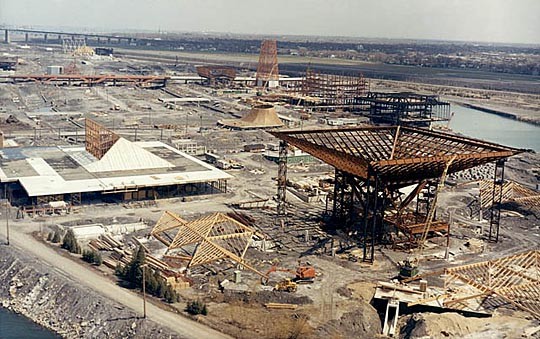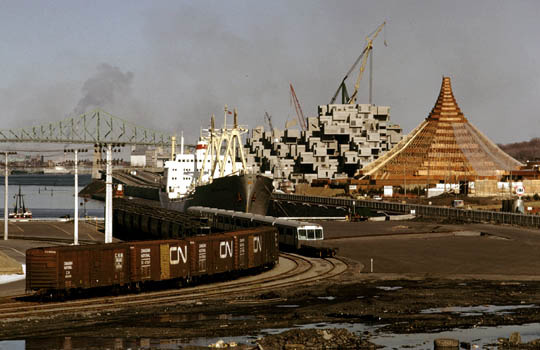|
Pavilion construction taking place on Īle Notre Dame In a conference: collapse If only he'd stop and listen, just for once! But The Colonel won't stop for anything. Sometimes you wonder if he ever has lunch without conducting a meeting at the same time. Has he ever gone out to dinner and lingered over his coffee? Does he even allow himself time to go to the bathroom? When he is first appointed to the job, The Colonel is a bachelor, and so he takes a room in the Queen Elizabeth Hotel, right across the street from Place Ville Marie. He comes down out of his room each morning about eight, walks a few steps through the pedestrian tunnel beneath Dorchester Street, and rides the elevator to his office. He gets his meals sent in and works from early morning until late evening -- to midnight, sometimes -- without once setting foot outside. And in those days, he's working a seven-day week. Of course all that drive, drive, drive has to catch up with him. The strain shows worst of all when he arrives at work on the morning of November 5, 1965. The Colonel's secretary, Yolande Beaumier, definitely not a member of the nail-filing, paperback-reading, miniskirt set, seldom fails to say exactly what she thinks. "You look terrible," she tells him. "Didn't you sleep last night?" Two hours later, in the middle of a conference, The Colonel collapses. Diagnosis: exhaustion. Installed in a hospital bed and ordered to rest, The Colonel soon has a map and pointer sent in, and almost before they realize what's happening, the doctors and nurses are getting regular pep talks on how Expo is shaping up. Later a colleague chuckles, "The Colonel did a bigger selling job for Expo in the hospital than our salesman have done in the field." |
|
Habitat under construction. Once he's home for further recuperation, the Colonel has Expo people running in and out with maps, blue-prints, documents and letters. Even so, he has slowed down his pace; for a while he's down to a four-hour workday. When he eventually returns to the office he's given a couch and told to lie down and rest for at least half an hour a day. The Colonel is glad to get a couch; he never lies down on it, of course, but it's great for spreading out blueprints and charts. As the months go by, people around Churchill begin to see some merit in the Critical Path. CPM, as everybody calls it by now, does make it possible for supervisors to co-ordinate one project with another. For instance, you can order concrete trucked in on one day for several buildings and know they'll all be ready to take it. Crews installing sewer lines can be told it's okay to lock off such and such a road on a certain day, because building crews are scheduled around that interruption. There are gaffes, of course. One day a section head staring idly out of his window notices a bulldozer pull up where a crew has just laid sod. An animated conversation ensues; obviously the bulldozer driver is being told to keep off the new lawn. He sits behind the wheel until the sod crew leaves. Then he drives across their lawn and scoops out a big hole. A few hours later, another truck arrives. It's crew digs up the tree and trucks it away, leaving the lawn just as it was before the bulldozer arrived. 4/5
|



